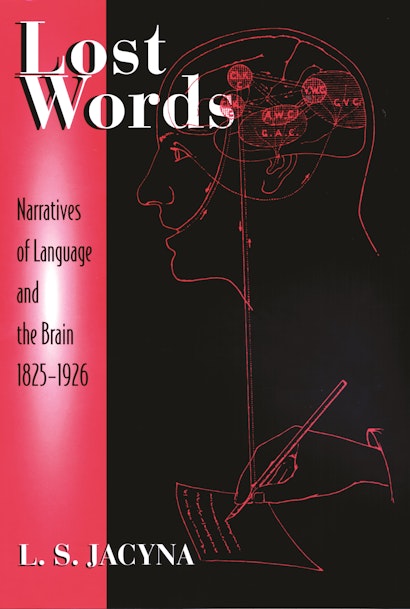In the mid-nineteenth century, physicians observed numerous cases in which individuals lost the ability to form spoken words, even as they remained sane and healthy in most other ways. By studying this condition, which came to be known as “aphasia,” neurologists were able to show that functions of mind were rooted in localized areas of the brain. Here L. S. Jacyna analyzes medical writings on aphasia to illuminate modern scientific discourse on the relations between language and the brain, from the very beginnings of this discussion through World War I. Viewing these texts as literature—complete with guiding metaphors and rhetorical strategies—Jacyna reveals the power they exerted on the ways in which the human subject was constructed in medicine.
Jacyna submits the medical texts to various critical readings and provides a review of the pictorial representation involved with the creation of aphasiology. He considers the scientific, experimental, and clinical aspects of this new field, together with the cultural, professional, and political dimensions of what would become the authoritative discourse about language and the brain. At the core of the study is an inquiry into the processes whereby men and women suffering from language loss were transformed into the “aphasic,” an entity amenable to scientific scrutiny and capable of yielding insights about the fundamental workings of the brain. But what became of the subject’s human identity? Lost Words explores the links among language, humanity, and mental presence that make the aphasiological project one of continuing fascination.
L. S. Jacyna is Senior Research Fellow at the Wellcome Institute for the History of Medicine, London. He is the author of Philosophic Whigs: Medicine, Science, and Citizenship in Edinburgh, 1789-1848 and, with Edwin Clarke, of Nineteenth-Century Origins of Neuroscientific Concepts.
"This is a remarkable book based on thorough research; it is written in an easygoing, readable style, and clinical cases are carefully worded . . .[It is] full of interesting stories about the development of aphasiology."—Choice
"As a demonstration of the possibilities opened up by certain strategies of textual analysis the book is very successful. . . . Lost Words makes a welcome and useful contribution, not least because it wears its metaphysics lightly."—Kurt Danziger, British Journal for the History of Science
"A thought-provoking volume reviewing writings covering 100 years in the scientific study of aphasia. If Jacyna's argument is accepted, today's neuroscientists will need to change their ways."—Erwin M. Segal, Journal History of Behavioral Sciences
"A highly reflective, historically meticulous study. It is an excellent book crafted with respect to language in both content and form, which should be a standard reference point in the history of neurology and neuroscience."—Roger Smith, Medical History
"Dr. Jacyna is one of the leading scholars in the new research program exploring the history of the brain sciences, helping to reconstruct an important story for our time. In Lost Words, he demonstrates the combination of scholarly and intellectual qualities that specialists have come to expect from him. This is state-of-the-art history of science."—Mark S. Micale, University of Illinois at Urbana-Champaign
"Lost Words constitutes a new contribution to the field in that it draws attention to hitherto neglected aspects of the classical literature on aphasia: for example, the way in which the medical author functions in these texts, the deployment of metaphors and diagrams, and the rhetorical use of previous texts. The book presents a set of strategies for reading not only texts about aphasia but also medical literature in general."—Kurt Danziger, Professor Emeritus, York University

